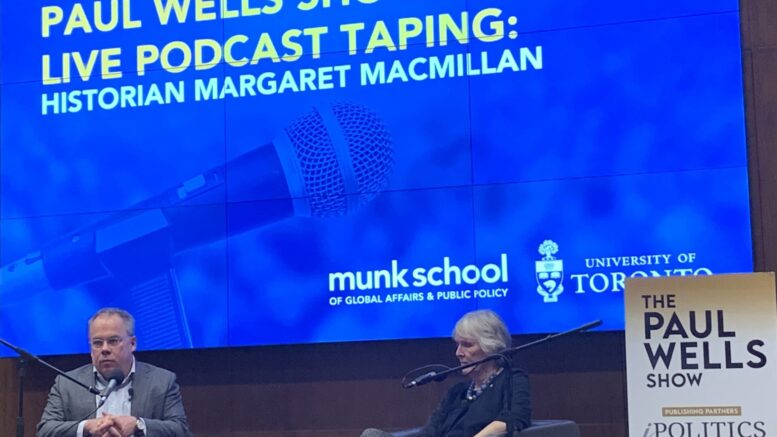Historians aren’t good at predicting the future, and usually get it wrong, celebrated historian Margaret MacMillan said during a live conversation for The Paul Wells Show in downtown Toronto.
During their wide-ranging conversation, she also provided her analyses of the Russia-Ukraine war to parallels in history, the post-COVID-19 world, progress on her new book, and love of tennis.
“I don’t think history repeats itself in a neat, precise way,” said MacMillan, author of War: How Conflict Shaped Us.
“Nevertheless, I think we can often see parallels or similarities between the past and the present.”
She opened up on being a historian examining current events: “We’re not good at predicting the future, we usually get it wrong…. The temptation is always to go back and look for parallels.”
The study of history opens up possibilities, MacMillan says. Yet as a historian, she is sometimes shy of answering questions about the future.
“I think we can ask questions. And I think being able to ask a question often is the beginning of trying to understand something,” she said.
If the British and the Americans understood the history of Iraq a little more, she says, they would know the Iraqis have a tradition of not liking foreign invaders and wealthy Americans. “History could have helped them prepare for that eventuality,” she said.
MacMillan also revealed details on a book she is working on about the Second World War. It will discuss the relationship between the “Big Three” in the Grand Alliance of the Soviet Union and their respective leaders: Winston Churchill of Great Britain, Theodore Roosevelt of the United States, and Joseph Stalin of the Soviet Union.
She says her book looks at how these leaders tried to plan for the post-war world we live in today, and how that was created out of the war.
“They spent a lot of time, even during the war, as they were dealing with huge strategic matters, just spent a lot of time thinking about what next, and so I’m finding it very interesting,” she said.
MacMillan admits she was surprised by Putin’s invasion of Russia, because “looking back, there were so many signs,” such as when the Russians moved troops out to the Belarusian and Ukrainian borders.
“Once you make that sort of gesture, if you pull back, it’s sort of that foolish. And so I think Putin got himself into a position, and I really do think it’s Putin’s war … It was quite clear in retrospect that something was going to happen,” she said.
“I was surprised, and I think I was surprised also because … I’ve lived in peaceful countries all my life, and war has been something that I suspect for most of us have happened elsewhere, in the past in other parts of the world, but not to us.”

